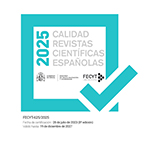Rousseau y Carl Schmitt: afinidades metodológicas en la génesis del concepto de soberanía popular y de las ideas democráticas
Resumen
Este estudio pretende demostrar el origen metodológico común del concepto de soberanía popular de Rousseau y Carl Schmitt, entendido como aquella autoridad política cuya legitimidad descansa en un principio democrático verdaderamente sustantivo. En primer lugar, se intentará probar cómo ambas obras serían la expresión de una común reacción al formalismo de una dogmática liberal que identifica metodológicamente la legalidad formal con la legitimidad política. Así, Rousseau critica un enunciado de la ley natural procedente de Locke que legitima la desigualdad social y política y justifica el gobierno burgués de los propietarios y Schmitt cuestiona un positivismo jurídico cuyo normativismo habría ocultado el auténtico valor sociológico del poder y la soberanía. En segundo lugar, una vez avanzada una crítica de las representaciones políticas que niegan el carácter sustantivo del pueblo soberano, se estudia el modo en que ambos formulan una propuesta metodológica alternativa. Aquí se prestará especial atención al modo en que la elaboración schmittiana incorpora, en un contexto de crisis de las formas liberales, una reelaboración de la crítica de Rousseau.
Descargas
Descarga artículo
Licencia
La revista Las Torres de Lucca. International Journal of Political Philosophy, para fomentar el intercambio global del conocimiento, facilita el acceso sin restricciones a sus contenidos desde el momento de su publicación en la presente edición electrónica, y por eso es una revista de acceso abierto. Los originales publicados en esta revista son propiedad de la Universidad Complutense de Madrid y es obligatorio citar su procedencia en cualquier reproducción total o parcial. Todos los contenidos se distribuyen bajo una licencia de uso y distribución Creative Commons Reconocimiento 4.0 (CC BY 4.0). Esta circunstancia ha de hacerse constar expresamente de esta forma cuando sea necesario. Puede consultar la versión informativa y el texto legal de la licencia.









